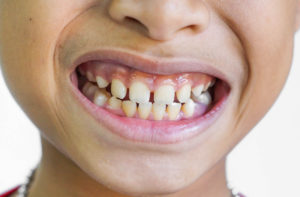Your baby’s first tooth is a major milestone, and sometimes it can feel as though we’re checking compulsively for it for months before we get even a glimpse of pearly white! The age the teeth emerge will vary quite a bit from baby to baby, but waiting month to month in vain can often up the anxiety factor for parents. Children’s Dental Center has good news: your baby won’t be toothless forever!
There are several factors that can cause tooth delay, and although teeth will usually appear in good time without any help on your part, knowing the “how” and “why” behind the delay can help you relax until they do.
Normal tooth eruption
When infants are born, most of their teeth have already developed and lie within their gums. They typically begin to emerge by around six months of age. The two lower front teeth tend to be the first to appear, with the four upper front teeth following. Other teeth generally arrive two at a time – one on each side. By the age of three, almost all kids will have a complete set of 20 baby teeth, which are also called primary, milk, or deciduous teeth.
What is considered a delay in tooth emergence?
As we’ve mentioned above, the age at which babies experience their first tooth eruption will vary widely. There is, however, what we would consider a normal range for the appearance of baby teeth. You can usually expect to see the first tooth between 4-15 months, with your baby having, on average:
- four teeth by 11 months old
- eight teeth at 15 months
- twelve teeth at 19 months
- sixteen teeth at 23 months
Teeth that don’t follow this normal tooth eruption pattern aren’t necessarily a concern, but having no teeth at all may signify a dental issue that needs further examination. If your baby has no teeth by 18 months or so, we recommend a visit to a dentist. Here at Children’s Dental Center, our doctors are all pediatric dental specialists, making them uniquely qualified to treat infants and young children.
Causes of delayed tooth eruption

There are several reasons a child’s teeth may emerge outside of the normal schedule, such as
- premature birth and low birth weight
- genetic abnormalities such as regional odontodysplasia and amelogenesis imperfecta
- vitamin D-resistant rickets
- nutritional deficiency
- cerebral palsy
- certain congenital syndromes
- cysts or tumors in the gums
- anemia
In some cases, late tooth eruption could just be a family trait, so if your mom has a good memory or you have access to your baby books, it might be worth seeing when you or your siblings cut your first tooth to compare!
A note on absent teeth
There is a congenital syndrome called adontia, the absence of any teeth at all, which occurs rarely and will normally affect the permanent teeth rather than the baby ones. Hypodontia is a different dental issue, where between one and six teeth are missing, as well as oligodontia, the absence of six or more teeth, and both are more common than adontia and often genetic.
The importance of baby teeth
A child’s primary teeth are important on multiple levels, from facial appearance to eating and speaking. They can affect things such as:
Speech development: Take the time to talk to a child with two missing front teeth sometime. Notice anything? This is an easy example of how greatly the presence of teeth contributes to a child’s ability to speak clearly. This holds true for properly aligned teeth as well. Even for babies, teeth that are healthy, well spaced, and reasonably aligned can contribute greatly to their ability to form words and speak clearly.
Proper chewing and eating: Proper digestion begins with the mouth, and a baby’s teeth are of huge importance when it comes to overall oral health and wellness. The process of chewing helps to break food down into digestible sizes. A child eating a diet rich in variation and texture stimulates and exercises the gums, and also provides a cleansing action for the teeth.
Development of muscles and jaw bones: Chewing, along with sucking, provides your baby with the opportunity to exercise their facial, tongue, and jaw muscles. Without well-developed jaw muscles, there is a possibility the jawbones won’t form properly. Chewing a wide variety of texture in food is a great opportunity for you little one to develop strong facial muscles and jaws!
Dental care for delayed teeth with Children’s Dental Center

If your baby has an endlessly gummy smile, you can enjoy it for quite a while before questioning a potential delay in tooth eruption. However, for kids who are tooth-free outside of the normal development schedule, setting up a dental visit with a trusted provider like Children’s Dental Center is recommended. A dental evaluation will be able to determine the reason for any delays in tooth emergence, giving your baby a headstart on recognizing and treating any potential problems.
With an office set up specifically for even the youngest patient, Children’s Dental Center is proud to provide comprehensive treatment to children in Midtown Memphis, Germantown, Arlington, and the surrounding areas. If you’re in the Mid-South and worried about the possibility of your baby’s teeth being delayed, or if you just have questions and concerns about their oral health we can help you with, get in touch with us today! Remember, however early or late they erupt, caring for your child’s teeth as soon as they appear is the best gift you can give them for long-lasting oral health.
